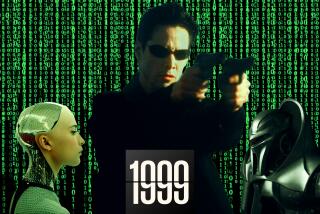Moviegoers Mixed on ‘A.I.’
- Share via
“Steven Spielberg’s new movie is--let me put this delicately--really, really, really bad. It’s bad in almost every way,” wrote John Podhoretz in the National Review, while Newsday’s John Anderson asserted “A.I. Artificial Intelligence” is “easily the most fascinating, provocative and perplexing film to come out of Hollywood in years.”
Like the movie they describe, reviews for “A.I.” have been disjointed and conflicted, running the gamut from full-bodied praise to revulsion.
For the most part, mainstream critics welcomed the film as an “intellectually challenging” fairy tale. Many moviegoers’ reactions range from merely satisfied to profoundly disappointed.
Entertainment Weekly found that 44% of 777 moviegoers polled online said, “‘A.I.’ was worse than [they] expected,” grading the film a B-minus, while professional critics averaged a B-plus. Of those responding to a Dallas Morning News review on the Internet, 27% gave the film a D or an F.
Some detractors complain that the narration and exposition are overdone, adding to the film’s lethargic action over 21/2 hours, while others were confused by what they describe as holes in the three-act storyline. The story itself is outdated, say critics, and is a compilation of tidbits from movies like “Blade Runner,” “Bicentennial Man,” “Tron,” “Mad Max” and even “WaterWorld.”
“It isn’t cohesive. It feels like malt liquor mixed with fine wine,” wrote “user54” on a DreamWorks message board. “It seems to me that the fans of this film seek to catagorize [sic] the detractors as ignorant people who only want typical Hollywood fanfare. However, I dislike this film because it has way too much typical Hollywood in it.”
Another posting contends, “Spielberg was trying too hard to please too many people. The movie was too maudlin to be anything but a kiddie film and [has] too many sexual references that were too revealing for a kids’ film. I did not know whether to leave due to utter boredom, or stay just to test my stamina.”
Movie critics focused on the film’s contrasting styles, mapping out the on-screen interplay between the generally uplifting Spielbergian drama and the darker themes of the late Stanley Kubrick, who was the initial driving force behind the project.
The general consensus: “‘A.I.’ is a collection of extremes that tend to cancel each other out,” as Jeff Strickler of the Minneapolis Star-Tribune concluded.
Where that sits with moviegoers is unclear. “The basic problem I have with it is that it fails to be a Stanley Kubrick film, but it also fails to be a Steven Speilburg [sic] film,” noted Josh Schreibman in a Kubrick discussion group on the Yahoo Internet site. Levon Parseghian of Torrance, a Kubrick fan who enjoyed the film, said “A.I.” stayed close to its originator’s style. “I kept saying throughout the film, ‘It’s gonna turn Spielberg now, it’s gonna turn Spielberg,’ but that never happened.”
Newsday’s Anderson concluded “A.I.’s” underlying themes would “be baffling audiences for the rest of the summer--possibly longer--and creating the kind of conversational vortex that consumes relationships the way the Flesh Fair chews up mechas.”
“After walking out I didn’t know what to think of the movie, but after having time to digest, it truly is a work of art,” said one viewer on the Dallas poll. “I feel that ‘A.I.’ is going to be one of the most misunderstood films that has been released in a long while. This isn’t a film where you can park your heart and your brains at the door before you enter the theater.”
More to Read
Only good movies
Get the Indie Focus newsletter, Mark Olsen's weekly guide to the world of cinema.
You may occasionally receive promotional content from the Los Angeles Times.










